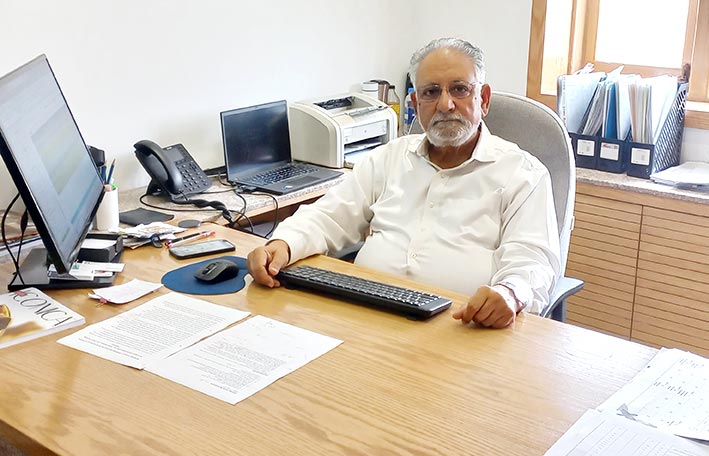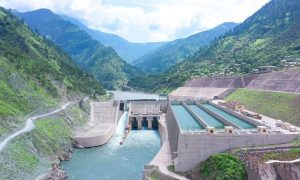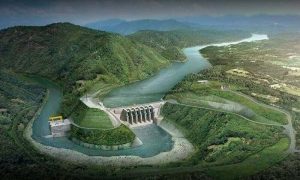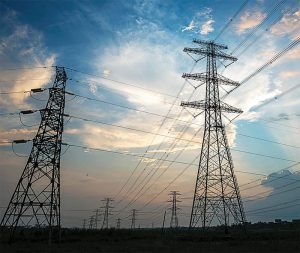An In-depth conversation with Engr. Fahim Siddiqui, CEO, FND Consulting Engineers
The economic landscape of Pakistan has taken a distressing turn in the last couple of years. What was once a promising era marked by growth and optimism in the waning days of 2021 has given way to a troubling decline, characterized by a palpable lack of trust in the government and a disheartening perception of politicians and the political process. These factors have collectively cast a shadow over business sentiment and stymied economic progress.
Engineering Post had an exclusive conversation with Engr. Fahim Siddiqui, the CEO of FND Consulting Engineers. During the conversation he juxtaposed Pakistan’s economic trajectory with that of India, shedding light on the root causes on the inadequacy of industrialization and the disbalance between annual expenditure on imports which is twice that of exports. He pointed out to a stark disparity in approach in the past between India & Pakistan—while India has consistently fostered the growth of local products that have now evolved into high-quality offerings, Pakistan has always leaned heavily on imports. The nationalization of industries in 1972 was a nail in the coffin of industrialization in Pakistan which then appeared to have the right trajectory. The result today is that India’s industrial sectors have flourished over time , while Pakistan relies heavily on imports.
The heart of the matter lies in the confidence—or lack thereof—that the Pakistani public places in the current government & political environment. Engr. Fahim Siddiqui astutely observed, “The reputation of politicians and bureaucracy, and lack of clarity in the political future of the country is so bad that many businesses are hesitant to initiate investments until a stable political setup is established”. This sentiment of distrust has reverberated through every facet of the economy, causing a sudden and jarring halt in the trajectory of progress. Industries, once humming with activity, have faltered under the weight of this disillusionment, further exacerbated by the nation’s long-standing reliance on imports.
Drawing a roadmap to recovery, Engr. Fahim Siddiqui, CEO, FND Consulting Engineers emphasized the urgency of pivoting from this import-reliant model to a domestically focused one. He envisions a Pakistan that nurtures its local industries and cultivates a culture of self-reliance. To grow the “Made in Pakistan” environment requires a vision & dedication of business houses and the unflinching support of the government. He underscored the necessity for a unified effort, stating, “For stability, people of Pakistan have to have the assurance of the government and confidence in the government.”
However, achieving such a transformation necessitates more than mere rhetoric—it requires tangible steps, including robust technology transfer mechanisms. During the conversation he advocated that strategic partnerships through joint ventures with established industries in technologically advanced nations is a key to success. “We should not invent the wheel from scratch; we need to benefit from developed nations by utilizing their technology here through Joint Ventures and technology transfer projects,” he said. “Pakistan needs to learn how Turkey grew in to a strong HVACR products exporter in the last 20 years; we need to adopt the policies that enabled this industrial growth in Turkey. Pakistan should also start industries in Pakistan based on JVs with Turkish manufacturers” he added.
During the conversation Engr. Fahim Siddiqui underscored the need for strong leadership, regardless of election outcomes. He envisions a scenario where the nation’s leadership, regardless of political affiliations, stands united in their commitment to Pakistan’s well-being. “He further reiterated that every Pakistani too must become a new Pakistani; each one of us should dedicate oneself to better ethical & moral standards resulting in justice and equality in Society. Leadership of the country, whoever wins the election, will have to demonstrate good governance and produce positive results that provide confidence to the nation; otherwise, things would not improve,” he asserted.
As a beacon of hope amidst these challenges, he appreciated the efforts of the Pakistan HVACR Society—a catalyst for change in the HVACR sector. He lauded their unwavering commitment to objectives, commending their consistent efforts. “Pakistan HVACR society is playing a vital role in the development of the HVACR sector of Pakistan. The Societies’ objectives are being achieved very consistently. It has grown a lot and many people have benefited from it,” he said.
A very serious issue, especially in the HVACR sector, is that most business houses prefer to trade rather than manufacture. This is the easy way out to make a buck, but does not create an indigenous technological growth.
While it is true that establishing a manufacturing setup in the country is very cash intensive and would require a lot of dedication, there are many groups in the country who have the ability to initiate it. The engineering community of the HVACR sector should develop engineering business plans and link up with financiers and established industrial businesses and set up industrial units in the HVACR sector. During the conversation with Engineering Post, Engr. Fahim Siddiqui provided a solution to this conundrum as well. “If different importing companies come together, forging a conglomerate aimed at initiating manufacturing projects in the country the finances would be divided and everyone would benefit from this as well,” he said.
Engr. Fahim Siddiqui’s insights provide a comprehensive analysis of the challenges that Pakistan’s economy faces. His call for a paradigm shift—from import reliance to domestic manufacturing—coupled with the imperative of government support, forms the crux of his vision for revitalizing the nation’s industries. By leveraging technology transfer, fostering joint ventures, and garnering industry-wide commitment, he envisions a future where Pakistan’s economy regains its vibrancy and secures a resilient position on the global stage. He aptly summarized, “If we manufacture equipment in Pakistan that conforms to established standards with proper certification, everyone will be willing to use it, within the country and we should be able to export as well.” The path forward beckons, illuminated by collaboration, innovation, and a collective drive toward economic resurgence.
Furthermore, Engr. Fahim Siddiqui emphasized the need for proactive decision-making and the cessation of import dependency. He scrutinized the existing tax structure, which places a disproportionate burden on the salaried class while exempting agriculture and some other sectors. He said it’s quite amazing that we have “non-filers” in this country, while every citizen should pay taxes. He said that such a taxation system offers little benefit to the economy and stresses the urgency for the leadership to gain public trust by displaying a steadfast commitment to the nation’s prosperity. “I believe that post-election, there is potential for positive change, but it rests on the shoulders of the elected leadership to usher in that transformation,” he said Engr. Fahim Siddiqui’s insights offer a comprehensive and sobering analysis of Pakistan’s economic challenges. His clarion call to shift from an import-oriented economy to one centred on domestic manufacturing, bolstered by government support and collaborative industry efforts, offers a compelling vision for the nation’s resurgence. By leveraging technology transfer, nurturing joint ventures, providing financial incentives to the industry both in terms of soft loans, tax breaks and tariff exemptions, investing in research & development, indigenous production can be substantially increased, and Siddiqui envisions a Pakistan poised to reclaim its economic vibrancy and secure a formidable standing on the global stage. Engr. Fahim Siddiqui, CEO, FND Consulting Engineers summarized “The path forward is not easy, but I believe our industry has the potential to be revived once again if it is given proper and dedicated attention with the intent of the progress of the country. We need to realise that the journey toward economic revitalization is paved with collaboration, innovation, and a resolute determination to embrace change,” he concluded.








